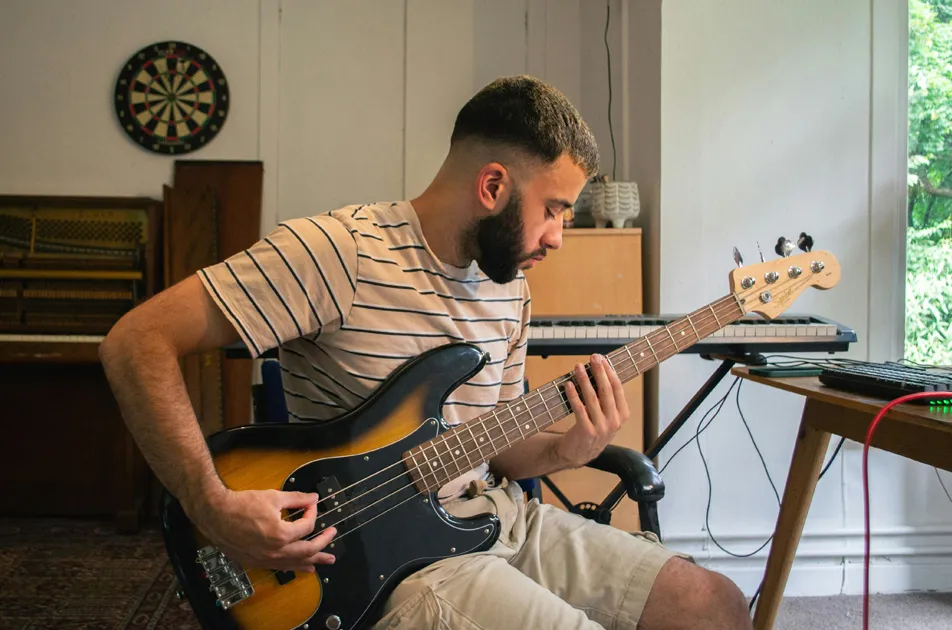Are you ready for the long hours and maximal effort of being a Music Director?
by Shawn Leonhardt of Disc Makers Blog
If you are the type of musician who can do it all, you may be suited to being a musical director. But understand, it’s not just a matter of being a jack-of-all-trades, you will need to specialize and multitask with a variety of skills, from musical to interpersonal, organization to imagination. In addition to a host of creative tasks, it will be necessary to arrange and produce musical arrangements for live performances and recordings.

A good live show involves a lot more than just climbing on stage and playing music — there is a lot of preparation, rehearsing, and arranging required to take a show to a professional level. As a music director, you’ll be in the position of being one of the main voices to help the group realize their artistic vision.
What a musical director does
It will be necessary to schedule and organize rehearsals, help band members arrange their parts, dial in backing tracks, and generally bring the compositions and performances together. Depending on your band members’ strengths, you may have to do a little or a lot of work. For artists skilled at their instruments, you may spend more time on the performance element of their show. For those who lean more heavily on the performance/charisma element, you may find yourself serving as a guitar teacher, or at least helping to connect members with teachers for their particular instruments.
The best music directors are passionate about music but less interested in being the center of attention. Musical directors are the glue holding things together, so your ultimate goal is to make sure every part of the show is polished. Your duties will be sure to include some of the following:
- Selecting music that will be played (and knowing all the parts yourself)
- Arranging music and finding the ideal key for individual songs
- Helping with songwriting, depending on the composition and repertoire of the band
- Scheduling auditions and rehearsals
- Preparing budgets
- Renting/obtaining equipment and gear
- Dealing with problems that arise
During the show
Once your act is rehearsed and ready, it’s time to get them on stage. It will be your job to be familiar with the venue and coordinate lighting and sound, whether you’re using your own personnel or outsourcing to the venue. You’ll need to have stage plots and input lists ready (well beforehand) and be sure you get the necessary soundcheck and tech rehearsals at the venue (as much as possible) to be sure everyone — performers and tech crew — are familiar and comfortable with the mechanics of the show.
Because many modern bands use so much software, choreography, and backing tracks, you’ll need to know the computer systems, music programs, and outboard gear inside and out. It’s not just about rocking some power chords!
Be prepared
You can almost count on technical glitches and strange incompatibilities, so you need to be prepared for anything. With everything else you’ll be in charge of, you may need to hire a specialist dedicated to handling tech issues, but you will want to have working knowledge of all the systems, and depending on the band and budget, you may be the tech person in the short term.
You’ll also need to have the right demeanor. Amid the chaos of any pre-show preparation, a musical director needs to be a calming, steady presence to help keep your players and performers grounded and act as the buffer between them and the technical crew. Duties on show day may include:
- Collaborating with the sound person, lighting director, stage manager, and everyone involved with producing the show
- Stepping in (on occasion) to fill in for a missing band member
- Providing feedback after the show to provide support and ideas for continual improvement
How to become a musical director
Sound like a gig you can handle? You may need to start by obtaining a music degree or some sort of formal training in performing or performance management. But, to a large extent, the abilities you need to excel at this position can only be earned through years of musical performances — either on or off the stage.
While there are plenty of examples of self-taught or gifted musicians who have found their way into the field, you’ll always be in a stronger position if you study music theory, know how to read sheet music, and have experience arranging full pieces for a band.
Experience counts
Experience playing live music and knowing the problems and stress that arise from that can also serve you well in this position. And beyond music, it is essential to have outsized people skills to be able to deliver good and bad news, keep the peace, and deal with the eccentric personalities that inevitably come with working with creative types.
This is especially important as you will be required to deliver constructive criticism — a band and a show are only as good as the players, and each person needs to be at their best at all times. Delivering praise and criticism is a necessary part of the job.
As you can see, musical directors for pop acts need to employ a variety of skills, and if you immerse yourself in studying music and networking in your local live scene — and making connections with musicians, studios, and music managers as well — you can build a reputation and ultimately find a band looking to work with someone to help bring their music and performances to the next level. The more musical talent, people skills, and hard work you bring to the table, the better the chances you can find players to work with.
Shawn Leonhardt is a freelance writer for Guitar Tricks, the original online guitar lessons program since 1998. With over four million members, Guitar Tricks is the premier guitar lessons platform for beginner guitarists and advanced players alike.





